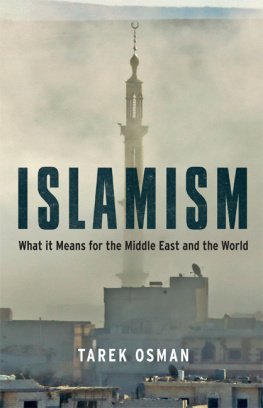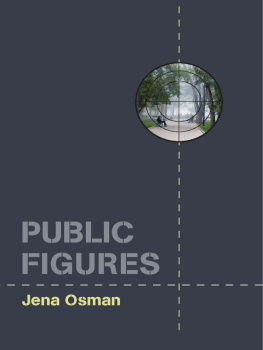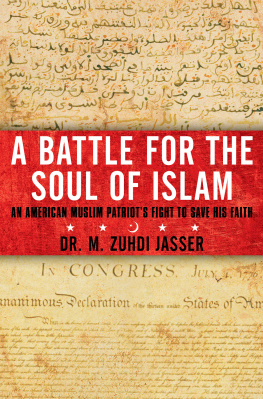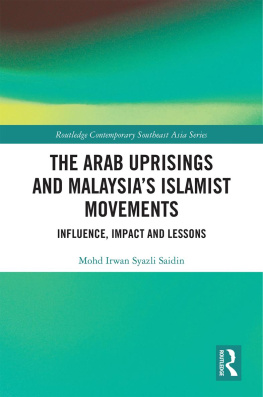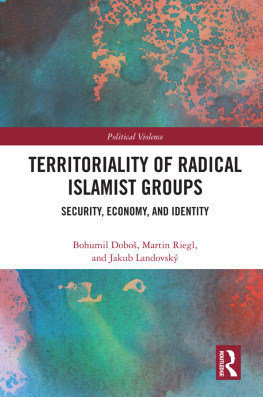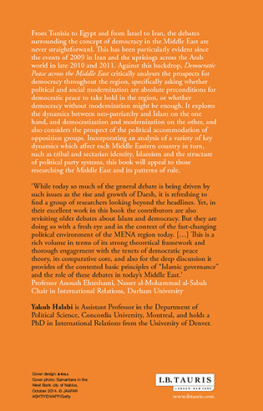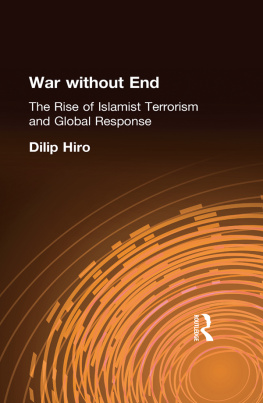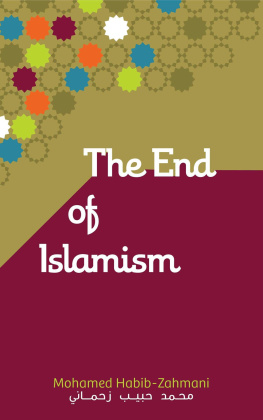

Copyright 2016 Tarek Osman
All rights reserved. This book may not be reproduced in whole or in part, in any form (beyond that copying permitted by Sections 107 and 108 of the U.S. Copyright Law and except by reviewers for the public press) without written permission from the publishers.
For information about this and other Yale University Press publications, please contact:
U.S. Office:
Europe Office:
Set in Minion Pro by IDSUK (DataConnection) Ltd
Printed in Great Britain by TJ International Ltd, Padstow, Cornwall
Library of Congress Cataloging-in-Publication Data
Osman, Tarek.
Islamism : what it means for the Middle East and the world / Tarek Osman.
pages cm
Includes bibliographical references and index.
ISBN 978-0-300-19772-3 (alk. paper)
1. Islamic fundamentalism. I. Title.
BP166.14.F85O86 2016
320.55'7dc23
2015030479
A catalogue record for this book is available from the British Library.
10 9 8 7 6 5 4 3 2 1
Contents
Introduction
In its fourteen centuries of history, Islam has been much more than just a faith. It has spawned elaborate legal systems to govern and guide a wide range of aspects of, and behaviour in, the lives of Muslims. Islam has been the basis for legitimizing political rule in various communities, countries and empires. It has inspired scores of philosophies that have sought to discern the essence and wisdom of the God of Islam, the meaning of being Muslim, and the purpose of the message that Muslims believe was sent in the seventh century by God, through the Archangel Gabriel, to a merchant in the Arabian Peninsula, the Prophet Mohammed, and which they believe is Gods last dispensation to humanity. In its earliest days, Islam was a reformation of a world sickened by ignorance and injustice. And it has been the cause that various militant groups, in different ages, have invoked as they have wreaked havoc in different parts of the world.
As Islam expanded, in the seventh and eighth centuries, from the Arabian Peninsula to Persia, Iraq, the eastern Mediterranean, North Africa and southern Europe, it gradually infused its rules into the lives of those societies. The newcomers (not just rulers, fighters and jurists, but also large communities that had left the Arabian Peninsula to settle in the new Islamic lands) absorbed many of the norms and customs of their new homes. Over time, these exchanges gave rise to new cultures in each of these lands.
The different political, economic and social experiences that these societies underwent in subsequent centuries sharpened the differences between their cultures. For example, the communities of the south of Egypt, an inward-looking agrarian region, developed a culture that was vastly different from that which evolved in the maritime-oriented societies of the eastern Mediterranean, a region that had witnessed varied interactions with many peoples and civilizations.
Different cultures developed different understandings of Islam. The Islam of tenth-century Islamic Iberia (Andalusia) or seventeenth-century Ottoman Turkey was the frame of reference for plural societies with relatively high levels of openness and tolerance. The Islam of twelfth-century Morocco was a strict legal and value system governing austere societies.
Not a single political authority managed to bring these cultures together. And yet, from the twelfth or thirteenth century, when Islam was entrenched as the primary constituent in the cultures of the wider Middle East (the Arabian Peninsula, the eastern Mediterranean, North Africa, Persia and Turkey), it became possible to speak of an Islamic world. Despite the different cultures and diverse understandings of Islam, what brought that world together was the fact that, for the largest segments of people in the vast majority of those societies, Islam was the basis for legitimizing power, organizing society, passing laws, and identifying and classifying the state (any state) as Islamic.
This changed in the first half of the nineteenth century. The exposure of the Arab and Islamic worlds to Western, and particularly European, modernity gradually eroded the quasi-ubiquitous acceptance of these parameters. Elites of politicians, social leaders, cultural luminaries and influential figures in different parts of the wider Middle East advocated and led gradual changes in how political legitimacy, legislation, state order and national identities were defined and understood. The work of those leaders aimed to reduce the influence and limit the role that Islam had had in politics and society. For them, Islam was (or should be perceived as) just a religion: its political, legal and social manifestations were various forms of Islamism that modern (or modernizing) societies should move beyond.
This alarmed the Islamists those groups that continued to believe that Islam transcends the framework of a religion, with its specific tenets of the faith, rituals and prohibitions that all Muslims must follow. For them, it was (and continues to be) a political, economic and social system.
The word system is intentional. For the vast majority of Islamists, the principles of the faith entail submitting to those rules that as a Muslim one believes were laid down by God in a divine revelation to the Prophet Mohammed. The vast majority of the most widely accepted interpretations of Islamic theology, law and jurisprudence over the past ten centuries apply these rules to politics, economics and many aspects of social life. These interpretations view the Islamic Ummah (the global community of Muslims) as an entity that shares more than just common theological beliefs and historical experiences. The Ummah here is a political entity: a Muslims belonging to it is at least equal to his/her national affiliation. These interpretations do not acknowledge man-made legal systems. Some of these interpretations divide the world into the abode of peace (the land of Islam) and the abode of war (the rest of the world). Others are less assertive and do not invoke such a view. But within the most widely accepted views of Islamic theology, from the tenth century until now, Islam is understood to be a quasi-comprehensive structure that covers Muslims spiritual and material lives. All of this means that, for those widely accepted interpretations, being (or becoming) a Muslim is a holistic framework. Here, a Muslim is not expected to embrace a modular form of belonging, accepting some parameters and rejecting others. One is expected to be all in.
The immense social development that the Arab and Islamic worlds experienced from the early decades of the nineteenth century led certain Islamists to define the system differently. From the late nineteenth century, some Islamists, especially those who had had extended exposure to Europe, put forward ideas that distinguished the pillars of the religion (the fundamental tenets of the faith) from its application in life; they separated al-deen (the faith) from al-dunia (life). This meant that, from within some of the most distinguished Islamic institutions, venerable voices limited the scope of Islamism. Almost always, this was done without using the term Islamism, which has hardly ever appeared in serious Arabic Islamic literature, either before or after the nineteenth century. In the first few decades of the twentieth century a period of impressive cultural effervescence in the Middle East some Islamic scholars went even further, and almost totally severed Islam from the factors that form Islamism.
Next page
